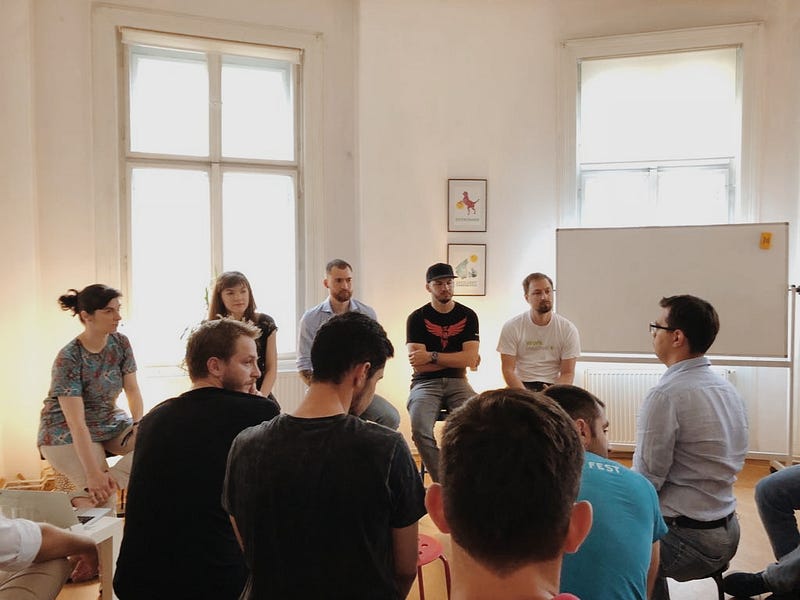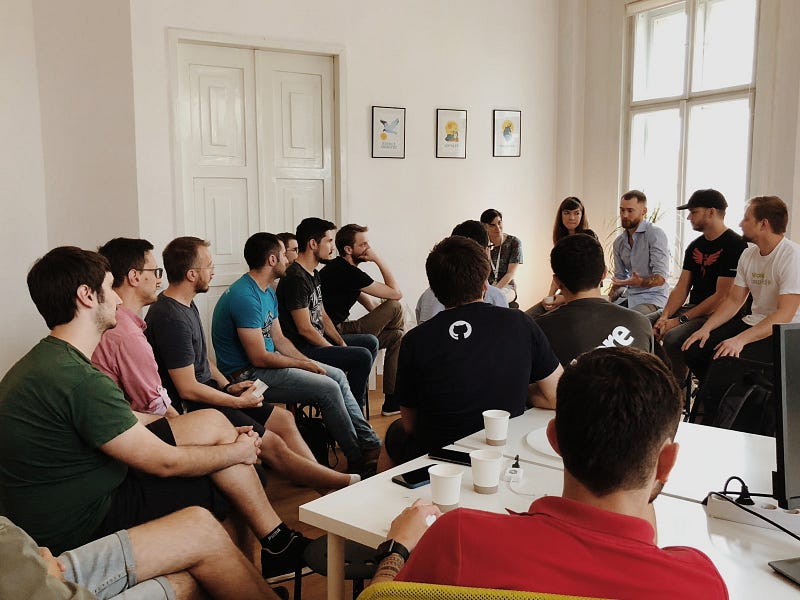On June 11, we hosted the “Ruby and Rails: Where to?” Techsylvania Satellite Event at our Wolfpack Digital office, gathering the Rails community of developers from Cluj. We created a safe space for sharing and learning from others. Here are some really nice questions that have been answered and topics that were debated at the Meetup.
Ruby and Rails: Where to?
The meeting was moderated by Oana Șipoș, who is a Ruby on Rails developer and the founder of the “Ruby à la Cluj” community. The conversations were organized in a panel format, with four interesting guests: Luiza Salantiu (Ruby on Rails Developer at 3Pillar Global), Vlad Zelinschi (Technical Consultant and Managing Partner at Strongbytes), Taylor Mock (Senior Software Consultant and Developer at Hashrocket) and Aurel Canciu (DevOps Solutions Architect at Upwork). All guests have had previous experience working with Ruby and Rails.
Here is a sneak peek inside the technically captivating opinions and discussions that took place between the guests, the moderator, and the audience.
The leading question was:
Should we learn something else or should we stay here with Ruby and Rails?

Oana, together with Luiza, Vlad, Taylor, and Aurel — the engaging guest speakers at the event.
Luiza started out by saying that what she really likes about the Ruby syntax is that it was built with developers in mind and that it recommends good design decisions. However, she believes inheritance is a bit overused, another problem is that it is fairly easy to make mistakes since there are many beginner tutorials available, which perhaps make it too easy for developers to take shortcuts.
Vlad talked about alternatives to Ruby and Rails for web developers to embrace in the future and particularly focused on Javascript first:
“I really believe in Javascript, which is an ecosystem that grew a lot, and what I really like is that it has transformed itself into a tool that you can use almost everywhere. Javascript became a language you can not only use to build for desktop, but also for mobile.” — Vlad Zelinschi
However, Vlad highlighted that even though the usage of Javascript has expanded a lot, the language architecture, unfortunately, has not evolved and has some important vulnerabilities, which will most probably not change.
Moving on to React, the guests talked about how most of its ideas and core particularities are borrowed ideas. Therefore, it was concluded that React is not necessarily something that is new, but it is new to front end. React is different from any other framework as it gives you the possibility to choose since you get to decide what you add on top of the base stack which is minimal.
Taylor systematically examined the pros and cons of Ruby and Rails as opposed to Elixir. Here is a list of what he likes about Ruby and Rails: the convention over configuration paradigm, the short time it takes to launch something, the high quality, active and helpful community, his main dislike being that scaling may become expensive, as there are things you may end up spending money for where other programming languages can get you for free.
“I like the short time it takes to launch something — that’s one of the things Rails initially brought to the table: you can create a blog in 15 minutes.” — Taylor Mock
Speaking of Elixir, it was said that it is actually way over Rails by preserving all its best features. It is seen as faster and better, as you get a functional language that is easy to test and there are a lot of useful tools. It can be easily scaled, as literally everything can be developed as a micro-service, scaled individually, and integrated. Initially, the community was not big enough, there were not enough libraries, and the project itself was too early stage. Very recently, this has stopped being a problem.
The biggest issue with Elixir, however, remains with the deploy configuration, which is hard to get used to and makes the time-to-launch fairly longer.
Aurel spoke about his first experience with Ruby, as an easily comprehensible language, which makes starting to program with it easier than with other languages. He also spoke about the advantages of the strong community, with tons of informative articles, resources, and libraries. He also mentioned that testing, in general, can be challenging if the project is large.
“With Ruby and Rails, you can code and base your work on tons of resources.” — Aurel Canciu
The potential dangers in the easy learning curve were highlighted again, along with some imperfect patterns which stem from the fact that they were designed initially to solve some specific Basecamp problems (note: Basecamp created the Rails framework).

The audience was all-ears and contributed with remarks, questions, and jokes to the meetup.
Oana asked the final question:
Will we have work to do in the future as Rails developers?
The guests all mentioned there is a lot of demand for web development and there are many exciting directions to explore. Luiza mentioned that even though there are new languages and frameworks available, we should trust Rails more for the future too, as it has proven its advantages and it stood the test of time. Additionally, there are already a lot of projects — big ones — that have Ruby at their core and might not want to move to Elixir or other options. As with everything new and buzzing, Ruby may temporarily lose traction on production in favor of developers experimenting with new frameworks. Still, it will remain popular and reliable.
“We must not forget that Rails, like other frameworks, has reached a plateau and is still very popular. The newer frameworks have not yet passed the test of time, which makes me believe in Ruby and Rails.“ — Luiza Salantiu
To summarise, there are currently many exciting directions for developers to explore besides Ruby and Rails, promising even better scalability opportunities and more robust patterns, however Ruby and Rails will still sit at the top and have a good future ahead, given the friendly syntax, the short time-to-launch, accessible deploy configuration, and the relatively good scalability prospects. Plus, it has stood the test of time.
At Wolfpack Digital we have a passionate team of Ruby on Rails developers and we also believe in the power of Rails, having experienced it first hand in start-up projects as well as in large-scale projects.
We, of course, ended the meet-up with some geeky socializing and tasty food and drinks.

Spot the surprise “web developer” at the meeting.
Afterward, we all returned home in a reflective mood, thinking about the deep talk about the future of Ruby and Rails and web development, in general, we had just had, and about how plunging into such big-picture conversations is always beneficial for progress in both local communities and development efficiency. This is an exercise we definitely want to pick up again!
Want us to build your app? Contact us and let's build powerful web and mobile apps together!
Want to work with us? Because Wolfpack Digital is hiring.
In case you are a Front-End developer and you want to test your skills, we have prepared a Quiz for you.
💪 Take the Quiz Now.
Have you ever wondered how to develop mobile apps with Ruby on Rails? We have prepared an article on this topic, so make sure to read it!









